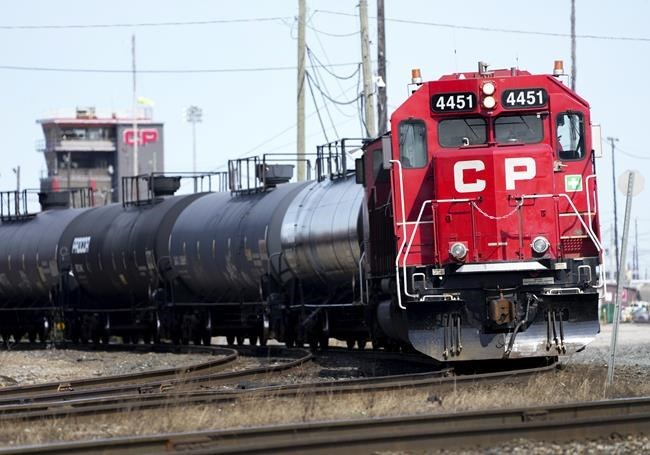Canadian Pacific Railway Ltd. saw revenue and profits dip in its first quarter as a weak grain harvest, a harsh winter and a work stoppage took their toll — though CP still expects major growth later this year.
CEO Keith Creel said last year's drought devastated grain volumes, while frigid weather early in 2022 and a two-day strike in March brought down revenue by six per cent and earnings by two per cent year over year.
“It was a tough quarter. I’m not here to make any excuses," Creel told analysts on a conference call Wednesday.
He said weather and COVID-19 hurdles were "uncontrollable" with roughly 500 employees going on sick leave due to the Omicron variant.
"This was going to be a tale of two halves."
The Calgary-based company reported results a day after rival Canadian National Railway Co. cited tough operating conditions and global economic uncertainty for its weaker profits, although adjusted earnings and revenues increased.
Volume dropped across all nine shipment categories, from energy to automotive, though revenue increased in five of them due partly to price hikes.
Revenue from grain shipments — typically the railroad operator's biggest money maker — tumbled 20 per cent, putting it below container traffic. Grain carloads plunged 28 per cent, despite a major boost in U.S. grain haul.
A frigid winter reduced freight capacity, as low temperatures impair a train's air-brake systems, necessitating shorter trains and slower speeds.
Fuel costs rose by a third year over year, further slimming profit margins. And supply chain snarls, including equipment backlogs and a global computer chip shortage, brought down automotive revenues by 16 per cent.
“It was tough to build any momentum and rhythm despite what I would consider a strong demand environment," said chief marketing officer John Brooks.
Nonetheless, CP's outlook for the year remains “largely unchanged,” Creel said. He still expects double-digit growth in revenue ton miles — the industry metric gauges revenue per volume of freight transported — in the second half of 2022.
He said CP has submitted data to clarify what the U.S. Surface Transportation Board deemed an "inconsistency in the calculation of traffic density numbers” that were submitted to it and to its environmental analysis office regarding the railway's proposed acquisition of Kansas City Southern.
The STB's request for that data put the regulator's review of the purchase on pause.
“We do not see this material as delaying the combination. We still anticipate a ruling, at the latest, by early 2023,” Creel said, noting the pause is ongoing.
The US$31-billion deal would pave the way for North America's only railroad stretching through Canada, the U.S., and Mexico.
CP said total net income slipped to $590 million in the quarter ended March 31, compared with $602 million in the same period in 2021.
First-quarter revenues fell to $1.84 billion from $1.96 billion last year.
Diluted earnings per share plunged to 63 cents from 90 cents a year earlier, well below analyst estimates of 73 cents per share, according to financial data firm Refinitiv.
The first-quarter operating ratio hit 70.9 per cent versus 60.2 per cent a year earlier. The figure measures a railway's efficiency, dividing operating expenses by net sales — the lower the number the better.
This report by The Canadian Press was first published April 27, 2022.
Companies in this story: (TSX:CP)
Christopher Reynolds, The Canadian Press




